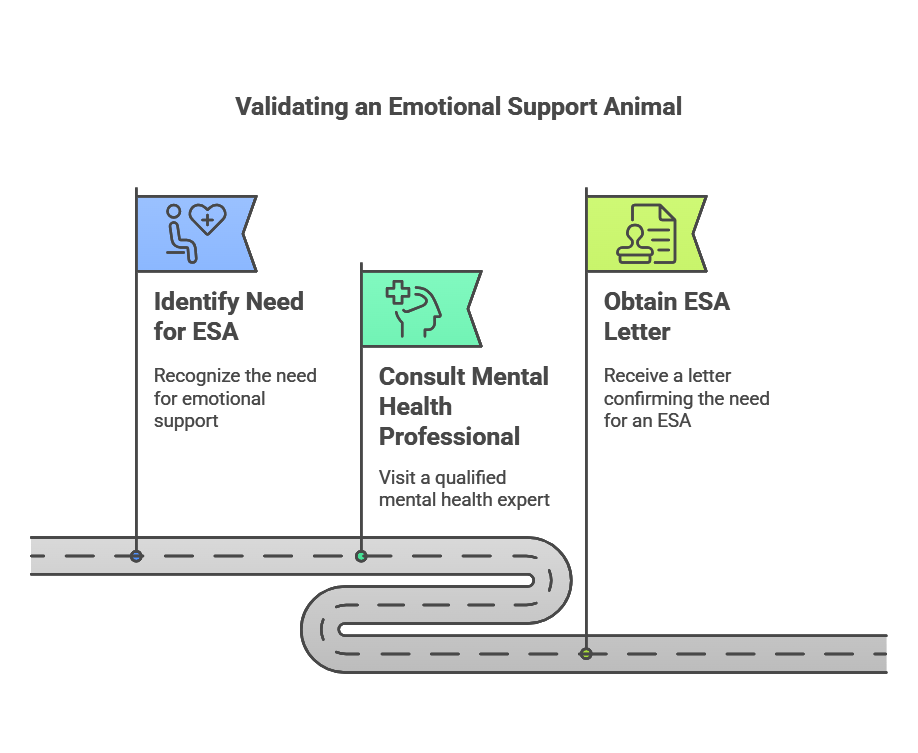(3)
Spend more to get free priority shipping
Great. You will get complimentary priority shipping for free.
Previous registration has been removed from the cart as only one animal registration is allowed at a one time.
Please note that there is no unified Assistant Animal database registration in the USA.
You cannot verify information from other registrars on the ESACERT.com website
Are you wondering if a landlord can charge a pet deposit for an emotional support animal? Emotional support animals give comfort to those with mental health conditions. This article will guide you on what the Fair Housing Act says about it. Keep reading to learn more. Key Takeaways Landlords cannot charge a pet deposit for an emotional ...


Are you wondering if a landlord can charge a pet deposit for an emotional support animal? Emotional support animals give comfort to those with mental health conditions. This article will guide you on what the Fair Housing Act says about it.
Keep reading to learn more.
Emotional support animals are protected under the Fair Housing Act (FHA) in relation to housing laws. Landlords are obligated to make reasonable adjustments for individuals with emotional support animals, irrespective of pet policies or deposits.
The Fair Housing Act (FHA) makes sure people with emotional support animals (ESAs) do not face housing discrimination. It says landlords must allow ESAs in rental housing, even if they usually say no to pets.
This law helps those with a mental disability by making landlords offer reasonable accommodations for ESAs. These rules apply everywhere, whether a place usually allows pets or has breed limits.
The FHA guarantees equal housing opportunities for individuals with disabilities, ensuring they can live with their emotional support animals.
Landlords cannot ask for pet deposits or extra fees for these companion animals. But they have to accept only real service animals and therapy animals, not exotic pets that could be unsafe or unreasonable requests.
To get this protection, the owner must have an emotional support animal letter from a health professional stating the need for their ESA.
Landlords cannot ask for a pet deposit for an emotional support animal. This rule comes from the Fair Housing Act. It says that owners of emotional support animals do not have to pay extra fees or rent for their animals.
I once had a friend who lived with her emotional support dog in an apartment. The landlord tried to charge her a pet deposit, but she knew her rights under the Fair Housing Act and did not pay it.
Even though landlords can’t charge upfront for emotional support animals, they can still ask tenants to pay if the animal causes damage to the property. So, while your initial move-in might be cheaper without pet deposits, always take care of your living space.
Next up, we’ll talk about what charges are allowed when you have an emotional support animal.
Emotional support animals can be charged cleaning and damage fees. These charges are allowed to ensure that the property is maintained properly.
Landlords can ask for money to fix damages caused by emotional support animals. This means if an animal hurts the property, the person living there must pay to make it right again.
Landlords cannot ask for this money before anything happens. They only charge after seeing damage.
Sometimes animals might mess up a place more than usual. In these cases, landlords can use the security deposit at the end of the lease to cover cleaning and repair costs. I once had to pay extra because my emotional support dog scratched up door frames in our apartment.
It showed me that owners need to keep their animals well-behaved and take care of any damage they cause.
Some landlords may deny an emotional support animal if it poses a direct threat to the property or other tenants. Read more about exceptions on our blog.
Landlords have the right to deny housing for emotional support animals if these pets pose a danger or are too destructive. If an animal is aggressive, damages property, causes disturbances, is not taken care of properly, or is hurt by its owner, a landlord can say no.
This includes large animals in small places that do not fit or unusual animals that need special handling.
Landlords must make sure everyone stays safe and comfortable. If an emotional support pet does something harmful or creates problems, they can take action. This means eviction for tenants whose pets don’t follow rules laid out under federal law and health professional guidelines.
To validate your emotional support animal, you need an ESA letter from a mental health professional. The letter should state that you have a mental impairment and require the emotional support animal for psychiatric care.

An ESA letter is essential for emotional support animal owners. It’s issued by a certified mental health professional (LMHP) and validates the necessity for an emotional support animal.
This letter transitions a common pet into an emotional support animal with special privileges. In the absence of this letter, any pronouncements about your pet being an ESA won’t be accepted by landlords.
Obtaining this letter typically involves consulting with an LMHP who comprehends your mental ailment or condition.
They even provide a swift, complimentary online evaluation to assess if you may be eligible for one. Be mindful, regulations in some states stipulate that you must have been in consultation with your LMHP for a minimum of 30 days to receive your ESA letter.
Subsequently, we’ll examine how to manage disputes with landlords about ESAs.
Handling disputes with your landlord about your emotional support animal can be stressful. Here are steps to make it easier.
I had to do these steps myself once when my landlord didn’t want my emotional support dog in the apartment. It took time, but showing my ESA letter and explaining my rights helped change his mind.
Landlords cannot ask for a pet deposit for an emotional support animal. This is because the Fair Housing Act says it’s not allowed. People with these animals can live in their homes without paying extra fees.
If the animal makes a mess or breaks something, the person might need to pay for that. It helps when people have a letter from health experts about their need for the animal. This keeps things clear between renters and property owners.
An emotional support animal, often a dog, provides comfort to individuals with mental illnesses such as depression or other mental diseases. Mental health professionals like therapists typically provide emotional support animal letters to verify the need for these animals.
Under the Americans with Disabilities Act, landlords should not charge a pet deposit for an ESA as they are considered reasonable accommodations rather than pets.
This rule applies broadly but there may be exceptions depending on the type of tenancy or lease agreement in place. It’s advised that tenants consult with an attorney at law to understand their rights fully.
If your landlord refuses your ESA despite having valid documentation from health professionals, you might be able to file a complaint under reasonable accommodation laws meant to protect renters.
Your current registration:
After change, your registration will be:
Your current registration:
will be replaced with:
You have entered the maximum number of characters
You have entered the maximum number of characters
You have entered the maximum number of characters
You have entered the maximum number of characters
You have entered the maximum number of characters
EC-0000001
Oct 26, 2025
-
-
-
-
-
-
You have entered the maximum number of characters
You have entered the maximum number of characters
You have entered the maximum number of characters
You have entered the maximum number of characters
You have entered the maximum number of characters
You have entered the maximum number of characters
You have entered the maximum number of characters
Enter at least 3 characters to search. You have entered: